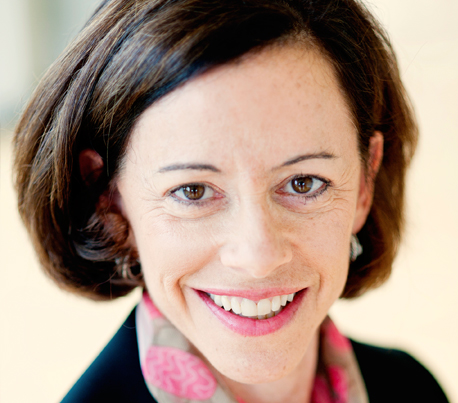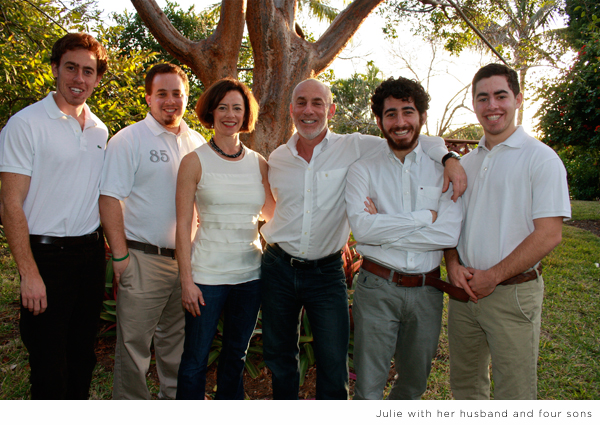
Location: Cincinnati, OH
Age: 52
Marital Status: Married
Education: M.A. in Tax Law At New York University
F. Scott Fitzgerald famously said, “There are no second acts in American lives.” But he didn’t live to see women today. Women who have careers, who then may choose to stay home to take care of their kids, and then might want to re-enter the workforce.
To one such woman, Julie Shifman, that’s a full three acts. A few years ago, Julie started a consulting business that helps women jump start careers after leaving them to take care of their families. The company’s name—Act Three. We chatted with Julie about her three acts, and how she helps women like her find their new calling.
What was your first act?
After college at Indiana University, I went to law school at The University of Colorado in Boulder. After law school, I went for an additional year at NYU, getting a masters in tax law. While I was in New York, I met my husband, Steve. Then we got pregnant, and didn’t want to have babies in New York City, so we moved back to Cincinnati. I started practicing law in Cincinnati. And I quickly ended up having babies number two, three and four. Four boys within five years. It was a lot.
Is that when Act Two began?
Basically. One firm in Cincinnati had given me a part-time offer. So I worked part-time for six years. And when my youngest was six months old, I went back full-time.
Who raised the kids?
It was a team approach. I had au pairs. I had university students. I had cleaning help. I was able to do it—because I had a lot of help. But by the time my kids were in middle to upper school, it wasn’t as easy to manage. Three of the four had behavior or learning issues, which became more problematic as they got older. So I left my law practice, both to spend more time with them, and also because I was struggling to figure out what I wanted to do next. At that point, I had been a lawyer for almost twenty years and it had been a great career. But I knew there was something else out there for me. I didn’t know what it was.

What did you end up trying?
I struggled for several years, while I was home with the kids, trying lots of different things. I was the executive director of a non-profit. I started a family business consulting company. Did a huge amount of community projects on a volunteer basis.
But nothing took.
Then about four years ago, I started realizing I wasn’t alone trying to figure this out. In fact, most of my friends, who were highly educated, who had had interesting careers, and chosen to stay home for 10, 15 years, were all saying, “What am I going to do now?” And I thought, “There’s no one out there helping people like me or them.” I guess there’s a market here. That was the beginning of what turned into Act Three. The idea started percolating four years ago and the business started three years ago.
How did you come up with the name?
In Cincinnati, we have the best branding company in the world—Proctor & Gamble. I hired an ex P & G branding guru and we sat in a room for two days throwing names out and eventually decided that Act Three was a great name for what I was trying to do with women. Because my demographic had an Act One which was their career. And we were the first generation to have a career. Most of us worked for about ten years. Then they had their Act Two. Many, many years of the important work of raising children. This is Act Three, the next stage of your life. Women today will lead healthy lives into their 90s. This can be a 40 year Act.
What separates Act Three from other consultants?
There are career coaches, but they don’t specifically focus on women in their 50s. There’s life coaching, but this really isn’t life coaching. We don’t get into your relationship with your husband. This is making sure you lead your life in an interesting and fulfilling way for you. I have really good experts that work with me.
Who are the experts?
For my clients that want to start a business, I have a really good women who’s a business coach. For my clients that want to go back to work, I have a woman who’s been in the career coaching field for 25 years. And for those that don’t want to go back to work or start a business, but just want to make sure they’re spending time in a productive way, those are the women that I coach.
What are the steps you take with a new client?
Some women know exactly what they want to do. They’ll say, “I’ve been out of work for twelve years. I was an accountant, and I want to go back to being an accountant.” That’s relatively easy. They go right to my career coach, and she’s masterful at making their resume as strong as possible, using all of the things they’ve done in her time off. And she’ll create a networking plan for them. She’ll practice interviewing, because if you haven’t interviewed in twelve years, you don’t want your first one back to be the real one. And then they’re on their way. Unfortunately, that’s very rare.
What’s the more common scenario?
Most of our clients come to us with absolutely no idea what they want to do. They’ll say, “I’m not even sure what I’m good at.” We start at the very beginning, with assessments, like “Who are you today?” “What do you love to do today?” And we either do this in workshops, or individually, depending on what the woman wants. Eventually they get to the point where they figure out what they want to do, through this process. And then, some women need to go back to school, some women are ready to go with their resume and start looking for a job. Some women don’t want to go back to work, they know what they’d like to do, and they’ll do it on a more volunteer, flexible basis. But with all our clients, one of the main things we provide is accountability.
Accountability?
For women that have been out of work for a while, raising kids for many years, they haven’t been accountable to anyone for a while. So they don’t have that muscle built up. They think, “I said I’d get this done in three weeks, now it’s three weeks and it’s not done.” But they’ve never had anybody care. One thing we can provide is that accountability. Tell us why. What kept you from accomplishing that goal? Just having that person checking up on you can keep you moving towards it.
What are some of the motivations of the women who come see you?
A lot of them are recently divorced. It used to be, if you got divorced 30 years ago, and you were married 25 years, the court would rule that women had to be supported the rest of their lives. That’s just not the case today. They’re told to get a job and they haven’t worked in 20 years. It’s really scary. These are the most motivated of our clients.
There are also a lot of women who need to reenter the workforce because of the economy. Their husband lost his job, or took a pay cut. Or they need to send a child to college.

Can you give us a couple of examples of two of your clients’ Act Threes?
For one client, Laura, who had been a graphic designer before staying home for many years with her children, we translated her artistic talent—as well as her passion for helping children—into a future career as an art therapist. She is currently in her second year of getting a master’s degree in art therapy. Another client, Martha, as a mother of five, had a great skill for organizing. We also uncovered that she had a passion for helping the elderly. Martha has decided that she is going to start a business helping elderly people organize their houses.
What is one of the biggest challenges women run into in this process?
The biggest challenge that these women run into is not having strong enough motivation to change. Because you’re asking yourself to do something really different. Push yourself out of your comfort zone. Changing the way your day runs. Having to learn something new. My typical client gets up in the morning, goes to Pilates class, meets a friend for lunch, helps out somewhere in the community, then spends the rest of the afternoon driving her kids somewhere. So this is a really big change. If you’re not very motivated, you’ll slip into your old patterns. You’ll find a way. “I didn’t really want to do that new thing.” Or “My mom is sick, I have to take care of her.” I find that happens a lot.
What is the first step a woman who wants to start her Act Three can take?
If you have that gnawing feeling that you know you want to do something new, but you haven’t done it, you have to figure out why you haven’t done it. Sit down and be honest with yourself. “Is it because I’m scared? What am I scared of?” And I recommend doing this with a girlfriend. Because if you do it with a spouse, there are too many other things at play. Some spouses don’t want their wives to go back to work. “Who’s gonna pick up my dry cleaning?”
If you have the feeling you want to do something new, but you don’t know what exactly, that’s tougher. For those women, sit down with a girlfriend and talk through everything that brings you joy. Everything from gardening to reading to children. “What are all the things I can do involving these activities?” Maybe you can read to children at the local church for instance. Brainstorm. All kinds of interesting ideas come up.
What is your favorite rest in Cincinnati?
Favorite place to shop?
Lulu Lemon. They sell athletic clothes.
How do you rejuvenate?
I get on my bike. I love being with my bike.
Favorite stylist?
Sean at Alpine Hair Design.
For more information on Act Three, and to contact Julie about speaking at your women’s group, please visit www.actthree.com.

